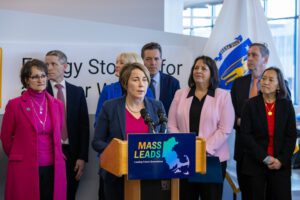Who is a member?
Our members are the local governments of Massachusetts and their elected and appointed leadership.

Gov. Maura Healey, center, highlights the life sciences and climate technology aspects of her economic development bill during a Feb. 29 visit to Form Energy in Somerville. She was joined by Lt. Gov. Kim Driscoll, second from right, administration officials, local legislators, industry leaders, and Somerville Mayor Katjana Ballantyne, far left. (Photo courtesy Governor’s Press Office/Joshua Qualls)
Gov. Maura Healey today filed a five-year economic development bond bill intended to strengthen the state’s leadership in life sciences and boost the climate technology and applied artificial intelligence sectors.
The omnibus bill, called the Mass Leads Act, also proposes support for small businesses, rural communities, workforce development, and arts and culture.
The bill is a central part of a 10-year economic development strategy to execute the vision outlined in the administration’s 2023 economic development plan: Team Massachusetts: Leading Future Generations.
The governor announced yesterday that her bill would include a 10-year reauthorization of the Life Science Initiative, as well as a new 10-year investment in climate technology to compete in the growing clean energy marketplace.
Of note to municipalities, the bill includes five-year capital authorizations for existing programs that are core parts of the state’s economic development toolbox, including programs offered through the Community One Stop for Growth, as well as capital resources for advanced manufacturing and the tourism and cultural sector.
These investments include:
• $400 million for the MassWorks Infrastructure Program for public infrastructure improvements to spur private development and create jobs
• $100 million for the Rural Development Fund to provide financial support for infrastructure improvements and community planning efforts in rural communities
• $100 million for the Seaport Economic Council to support marine economies in coastal communities
• $99 million for Advanced Manufacturing, for flexible grants to support advanced manufacturing initiatives through Mass Tech Collaborative
• $50 million for the Cultural Facilities Fund to provide resources for capital improvements at cultural facilities, such as museums, theaters and performance venues
• $40 million for Destination Development Grants to support capital improvements at tourism assets across Massachusetts
The bill also includes $100 million for Local Economic Development Grants.
It would also codify the rural community designation, with the goal of creating access to more resources for local economic development initiatives, such as the Rural Development Fund.
On permitting, the bill would make several targeted reforms to expand opportunity and improve predictability for development. These include:
• Updates to Chapter 43D relative to expedited local permitting
• Elimination of the interagency permitting board and consolidation of its functions within the permit regulatory office at the Executive Office of Economic Development
• Modest reforms to the existing permitting landscape with the permit extension act and technical clarifications relative to municipal permitting safeguards for special permits and site plan review
Competitive edge
In total, the legislation recommends approximately $2.8 billion in bond authorizations for capital-related grantmaking, of which $1.75 billion is dedicated to the reauthorization of existing programs and $1 billion is proposed for new capital initiatives. The bill also proposes $750 million in economic development tax program changes, which includes the creation of the new climatetech incentive program and an expansion of the life sciences incentive program.
The governor said her bill “will position Massachusetts to maintain our competitive edge on the global stage,” and that the package prioritizes “equity, affordability and competitiveness.”
Lt. Gov. Kim Driscoll added that the package “invests in the entrepreneurs and small businesses that are the backbone of our communities, works to close the digital divide and bring more regional equity into our economy, and empowers local government with the tools they need to combat climate change.”
The governor said the proposal is focused on three priority areas: investing in the fundamentals to enable economic growth, retaining and attracting the best talent across all backgrounds, and supporting businesses that power the state’s economy.
In addition to the climate technology initiative, new capital programs include:
• $100 million for an Applied AI Hub, for grants to facilitate the application of artificial intelligence across the state’s ecosystem, which will be informed by the strategic priorities of the AI Strategic Task Force
• $75 million for a Massachusetts TechHub, to establish a new program modeled on the U.S. Economic Development Administration’s Regional Technology and Innovation Program
• $25 million for a Robotics Investment Program
• $25 million for a Business Builds Capital grant program to support business improvements, such as energy efficiency, via the Business Front Door
Executive orders
Gov. Healey also signed two related Executive Orders.
One establishes a Cultural Policy Development Advisory Council that will be charged with developing recommendations to the administration for how to support and grow the state’s arts and culture sector.
The second Executive Order establishes a council tasked with reviewing the existing procurement laws and related processes for public building construction projects, such as state laws relative to surety bonds, to identify barriers to small, emerging, and diverse businesses, and to make recommendations that address them.
The full legislation and key issue briefs will be available on the Executive Office of Economic Development website.